1957 Thunderbird E Bird Dual Quad Fully Frame Off Restored Red American Classic
- Make: Ford
- Model: Thunderbird
- SubModel: with hardtop
- Type: Convertible
- Year: 1957
- Mileage: 5
- VIN: E7FH217479
- Color: Red
- Engine size: 312 V8
- Number of cylinders: 8
- Power options: Power Windows
- Fuel: Gasoline
- Transmission: Automatic
- Drive type: RWD
- Interior color: Red
- Options: Convertible
- Vehicle Title: Clear
- Interested?
1957 Ford Thunderbird Description
| 1957 Thunderbird E Bird Dual Quad Fully Frame Off Restored Red American Classic
I wanted to let all interested parties know that this beautiful Thunderbird will be at the 2017 Carlisle, PA. Ford Nationals on June 2-4, 2017. This car will be with the E and F ford Thunderbird exhibit for inspection. If you are interested, please go to Carlisle and see it in all it’s glory. I am pleased to offer this gorgeous frame off restored 1957 Ford Thunderbird with factory 312 CI motor, dual quads with an automatic transmission. VIN # E7FH217479. Car was completely frame off restored in 2015 and has only been driven approx. 5 test miles since then. Notable options include, power brakes and Ford-O-Matic 2 speed automatic transmission and hardtop. By the numbers and dates:– Engine block – ECZ-6015C – Intake manifold – ECG-0424 dated Feb. 1957 – Carbs – ECJ-9510AB, ECJ-9510AA – Radiator – Jan. 1957 – Fuel filter – ECI-9155AB – Heads – ECZ-G – Correct dual quad distributor – Correct original Valley Pan Tom Stocks who operates The Classic Thunderbird Club International (CICI) 1957 E-Code Registry has personally witnessed this car at the 2015 New Mexico show. He has authenticated the car with it’s original invoice and is available for discussion. The car scored a gold award undercarriage judged in the primary original class and elevated to senior status on it’s inaugural showing. For more on the History of the ’57 Tbird, read on:Evoking the mythological creature of Indigenous peoples of North America, the Thunderbird entered production for the 1955 model year as a sporty two-seat convertible. Unlike the Chevrolet Corvette, it was not marketed as a sports car. Rather, Ford created a new market segment, the Personal Car to position it. In 1958, the Thunderbird gained a second row of seats. Succeeding generations became larger until the line was downsized in 1977, again in 1980, and once again in 1983. Sales were good until the 1990s, when large 2-door coupes became unpopular; production ceased at the end of 1997. In 2002 production of the Thunderbird started again, a revived 2-seat model was launched, which was available through the end of the 2005 model year. From its introduction in 1955 to its most recent departure in 2005, Ford has produced over 4.4 million Thunderbirds.[1] A smaller two-seater sports roadster was created at the behest of Henry Ford II in 1953 called the Vega. The completed one-off generated interest at the time, but had meager power, European looks, and a correspondingly high cost, so it never proceeded to production. The Thunderbird was similar in concept, but would be more American in style, more luxurious, and less sport-oriented. The men and their teams generally credited with the creation of the original Thunderbird are: Lewis D. Crusoe, a retired GM executive lured out of retirement by Henry Ford II; George Walker, chief stylist and a Ford vice-president; Frank Hershey, chief stylist for Ford Division; Bill Boyer, designer Body Development Studio who became manager of Thunderbird Studio in spring of 1955, and Bill Burnett, chief engineer. Ford Designer William P. Boyer was lead stylist on the original 1955 two-seater Thunderbird and also had a hand in designing the future series of Thunderbirds including the 30th Anniversary Edition. Hershey’s participation in the creation of the Thunderbird was more administrative than artistic. Crusoe and Walker met in France in October 1951. Walking in the Grand Palais in Paris, Crusoe pointed at a sports car and asked Walker, ‘Why can’t we have something like that?’ Some versions of the story claim that Walker replied by telling Crusoe, “oh, we’re working on it”…although if anything existed at the time beyond casual dream-car sketches by members of the design staff, records of it have never come to light. Walker promptly telephoned Ford’s HQ in Dearborn and told designer Frank Hershey about the conversation with Crusoe. Hershey took the idea and began working on the vehicle. The concept was for a two-passenger open car, with a target weight of 2525 lb (1145 kg), an Interceptor V8 engine based on the forthcoming overhead-valve Ford V8 slated for 1954 model year introduction, and a top speed of over 100 mph (160 km/h). Crusoe saw a painted clay model on May 18, 1953, which corresponded closely to the final car; he gave the car the go-ahead in September after comparing it with current European trends. After Henry Ford II returned from the Los Angeles Auto Show (Autorama) in 1953 he approved the final design concept to compete with the then new Corvette. The name was not among the thousands proposed, including rejected options such as Apache (the original name of the P-51 Mustang), Falcon (owned by Chrysler at the time),[2] Eagle, Tropicale, Hawaiian, and Thunderbolt.[3] Rather, it was suggested to the designer and, in the hurry-up mood of the project, accepted.[3] First generation (1955–1957) 1957 Ford Thunderbird The Ford Thunderbird began life in February 1953 in direct response to Chevrolet’s new sports car, the Corvette, which was publicly unveiled in prototype form just a month before. Under rapid development, the Thunderbird went from idea to prototype in about a year, being unveiled to the public at the Detroit Auto Show on February 20, 1954. Like the Corvette, the Thunderbird had a two-seat coupe/convertible layout. Production of the Thunderbird began later on in 1954 on September 9 with the car beginning sales as a 1955 model on October 22, 1954. Though sharing some design characteristics with other Fords of the time, such as single, circular headlamps and tail lamps and modest tailfins, the Thunderbird was sleeker and more athletic in shape, and had features like a faux hood scoop and a 150 mph (240 km/h) speedometer hinting a higher performance nature that other Fords didn’t possess. Mechanically though, the Thunderbird could trace its roots to other mainstream Fords. The Thunderbird’s 102.0 inches (2,591 mm) wheelbase frame was mostly a shortened version of that used in other Fords while the car’s standard 292 cu in (4.8 L) Y-block V8 came from Ford’s Mercury division.[4] Though inspired by, and positioned directly against, the Corvette, Ford billed the Thunderbird as a personal luxury car, putting a greater emphasis on the car’s comfort and convenience features rather than its inherent sportiness.[4] Designations aside, the Thunderbird sold exceptionally well in its first year. In fact, the Thunderbird outsold the Corvette by more than 23-to-one for 1955 with 16,155 Thunderbirds sold against 700 Corvettes.[5] With the Thunderbird considered a success, few changes were made to the car for 1956. The most notable change was moving the spare tire to a continental-style rear bumper in order to make more storage room in the trunk. However, the addition of the weight at the rear caused steering issues, and was changed back in 1957. Among the few other changes were new paint colors, the addition of circular porthole windows in the fiberglass roof to improve rearward visibility, and a 312 cu in (5.1 L) Y-block V8 making 215 horsepower (160 kW) when mated to a 3-speed manual transmission or 225 horsepower (168 kW) when mated to a Ford-O-Matic 3-speed automatic transmission. The Thunderbird was revised for 1957 with a reshaped front bumper, a larger grille and tailfins, and larger tail lamps. The 312 cu in (5.1 L) V8 became the Thunderbird’s standard engine, and now produced 245 horsepower (183 kW). Other, even more powerful versions of the 312 cu in (5.1 L) V8 were available including one with two four-barrel Holley carburetors and another with a Paxton supercharger delivering 300 horsepower (220 kW). Though Ford was pleased to see sales of the Thunderbird rise to a record-breaking 21,380 units for 1957, company executives felt the car could do even better, leading to a substantial redesign of the car for 1958. Photos 1957 Thunderbird E Bird Dual Quad Fully Frame Off Restored Red American Classic Car is located in West Suburban Chicago. Contact Ron Susser
Legal Information And Disclaimer Vehicles & Other Items This item or vehicle is being sold as is, where is with no warranty, expressed written or implied unless there is a warranty in effect from the factory. The seller shall not be responsible for the correct description, authenticity, genuineness, or defects herein, and makes no warranty in connection therewith. No allowance or set aside will be made on account of any incorrectness, imperfection, defect or damage. Any descriptions or representations are for identification purposes only and are not to be construed as a warranty of any type. It is the responsibility of the buyer to have thoroughly inspected the vehicle, and to have satisfied himself or herself as to the condition and value and to bid based upon that judgement solely. The seller shall and will make every reasonable effort to disclose any known defects associated with this vehicle at the buyer's request prior to the close of sale. Seller assumes no responsibility for any repairs regardless of any oral statements about the vehicle or item. Seller reserves the right not to sell to any bidder with 0 or negative feedback or to any bidder for any reason. 10% (non-refundable deposit) in certified funds or bank to bank wire transfer is due within 2 business days of auction end and balance is due within 7 business days of auction end. Buyer is responsible for cost of shipping but seller may be able to assist in arranging shipping. I can be reached at (630) 567-0066 to discuss the item. Please see my other auctions for high quality new and used vehicles and other quality collectibles. Remember that your bid constitutes a legally binding contract to purchase this item. If you require an inspection, have it done prior to bidding. I strongly encourage all bidders to inspect vehicle personally or enlist the services of a professional inspector prior to placing a bid. After the sale, inspections are not recognized as a contingency to completing your obligation to your winning bid. If there are any questions regarding the above terms, please e-mail prior to bidding. Serious bidders only please. Good luck! Copyright 1999-2017 RonSusser. All Rights Reserved. All other trademarks, names, and anything else implied in this document are owned and protected by their respective owners. |
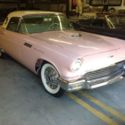 1957 Thunderbird E bird 270HP total frame off restoration one of 93 Dusk Rose
1957 Thunderbird E bird 270HP total frame off restoration one of 93 Dusk Rose
Mileage: 2
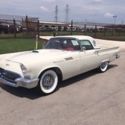 1957 FORD THUNDERBIRD--FACTORY "E" BIRD--DUAL QUADS---TOTAL RESTORATION---ESTATE
1957 FORD THUNDERBIRD--FACTORY "E" BIRD--DUAL QUADS---TOTAL RESTORATION---ESTATE
Mileage: 6,890
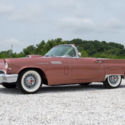 1957 Ford Thunderbird E Bird Dual Carb Correct Colors Highly Optioned
1957 Ford Thunderbird E Bird Dual Carb Correct Colors Highly Optioned
Mileage: 71,843
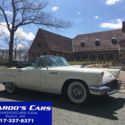 1957 FORD T-BIRD THUNDERBIRD CONVERTIBLE CLASSIC COLLECTOR CAR
1957 FORD T-BIRD THUNDERBIRD CONVERTIBLE CLASSIC COLLECTOR CAR
Mileage: 130,012
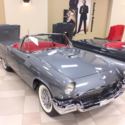 1957 Ford Thunderbird Convertible Dual Quad
1957 Ford Thunderbird Convertible Dual Quad
Mileage: 100
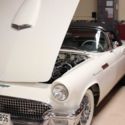 1957 Ford Thunderbird, E code,nut-&- bolt rest,312/270 HP V8, dual quad
1957 Ford Thunderbird, E code,nut-&- bolt rest,312/270 HP V8, dual quad
Mileage: 15,529
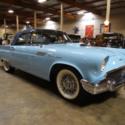 1957 Ford Thunderbird Convertible Frame off Restored California Car
1957 Ford Thunderbird Convertible Frame off Restored California Car
Mileage: 3,869
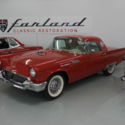 1957 HARDTOP THUNDERBIRD; FULLY RESTORED COSMETICALLY & MECHANICALLY; NICE!
1957 HARDTOP THUNDERBIRD; FULLY RESTORED COSMETICALLY & MECHANICALLY; NICE!
Mileage: 151
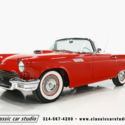 1957 Ford Thunderbird Convertible Fully Restored and Freshly Serviced w/Two Tops
1957 Ford Thunderbird Convertible Fully Restored and Freshly Serviced w/Two Tops
Mileage: 3,273
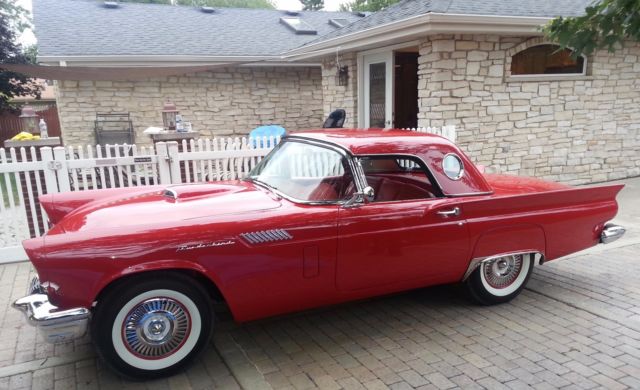
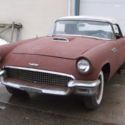 1957 THUNDERBIRD DUSK ROSE E CODE DUAL QUAD CAR FOR RESTORATION
1957 THUNDERBIRD DUSK ROSE E CODE DUAL QUAD CAR FOR RESTORATION